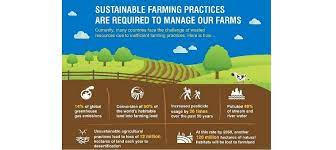Sustainable agriculture practices have become increasingly important for businesses in recent years, driven by growing consumer demand for ethically sourced products, environmental concerns, and the need to ensure long-term profitability. By implementing sustainable agriculture practices, businesses can mitigate environmental impact, improve resource efficiency, and enhance their reputation among consumers and stakeholders.
Agroecology and Regenerative Farming
Agroecology and regenerative farming are at the forefront of sustainable agriculture practices. These approaches emphasize biodiversity, soil health, and ecosystem resilience, reducing the reliance on synthetic inputs and chemical fertilizers. By adopting agroecological principles, businesses can improve soil fertility, enhance crop resilience to pests and diseases, and promote natural ecosystems within agricultural landscapes.
Precision Agriculture Technologies
Precision agriculture technologies, such as GPS-guided tractors, drones, and sensors, enable businesses to optimize resource use and minimize environmental impact. These technologies allow for precise monitoring and management of crops, soil moisture levels, and nutrient application, resulting in higher yields, lower input costs, and reduced environmental pollution. Additionally, precision agriculture can help businesses adapt to climate change and mitigate the effects of extreme weather events.
Water Conservation and Management
Water scarcity is a significant challenge facing agriculture, particularly in regions prone to drought and water stress. Sustainable agriculture practices focus on water conservation and management strategies to minimize water use and improve efficiency. Techniques such as drip irrigation, rainwater harvesting, and soil moisture monitoring help businesses optimize water allocation, reduce water waste, and safeguard water resources for future generations.
Integrated Pest Management (IPM)
Integrated Pest Management (IPM) is an eco-friendly approach to pest control that emphasizes prevention, monitoring, and non-chemical interventions. By employing IPM strategies such as crop rotation, biological control, and habitat manipulation, businesses can reduce reliance on synthetic pesticides, minimize harm to beneficial insects and wildlife, and promote ecological balance within agricultural ecosystems. IPM also helps businesses comply with regulatory restrictions on pesticide use and protect human health and safety.
Organic and Sustainable Certification
Obtaining organic and sustainable certifications can enhance the credibility and marketability of agricultural products. These certifications assure consumers that products are produced using environmentally friendly practices, animal welfare standards, and fair labor practices. By meeting rigorous certification requirements, businesses can access premium markets, command higher prices for their products, and build trust and loyalty with consumers who prioritize sustainability and ethical production.
Supply Chain Transparency and Traceability
Transparency and traceability are essential components of sustainable agriculture practices. Businesses must trace the origin of raw materials, track production processes, and verify compliance with sustainability standards throughout the supply chain. By implementing robust traceability systems and engaging in transparent communication with stakeholders, businesses can build trust, reduce the risk of fraud and adulteration, and demonstrate commitment to sustainability and responsible sourcing.
Collaboration and Partnership
Collaboration and partnership are critical for advancing sustainable agriculture practices across the industry. Businesses can collaborate with farmers, suppliers, NGOs, government agencies, and academic institutions to share knowledge, resources, and best practices. By working together to address common challenges such as soil degradation, water pollution, and biodiversity loss, businesses can drive collective action and create positive change at scale.
Conclusion
In conclusion, sustainable agriculture practices are essential for businesses to address environmental challenges, meet consumer demand for ethically sourced products, and ensure long-term profitability. By adopting agroecological principles, leveraging precision agriculture technologies, conserving water resources, implementing integrated pest management, obtaining organic and sustainable certifications, ensuring supply chain transparency, and collaborating with stakeholders, businesses can promote sustainability, resilience, and prosperity in the agricultural sector.
